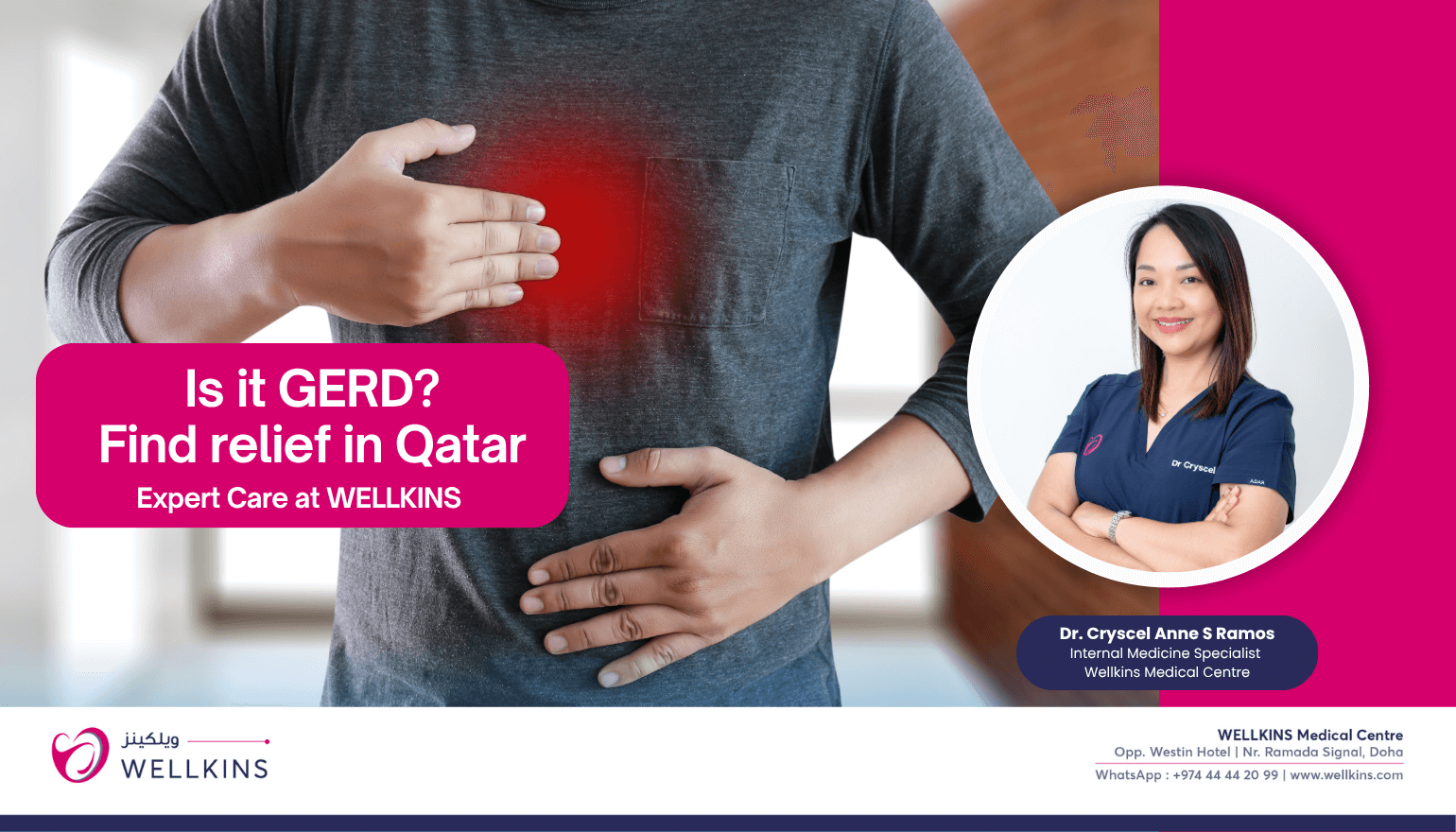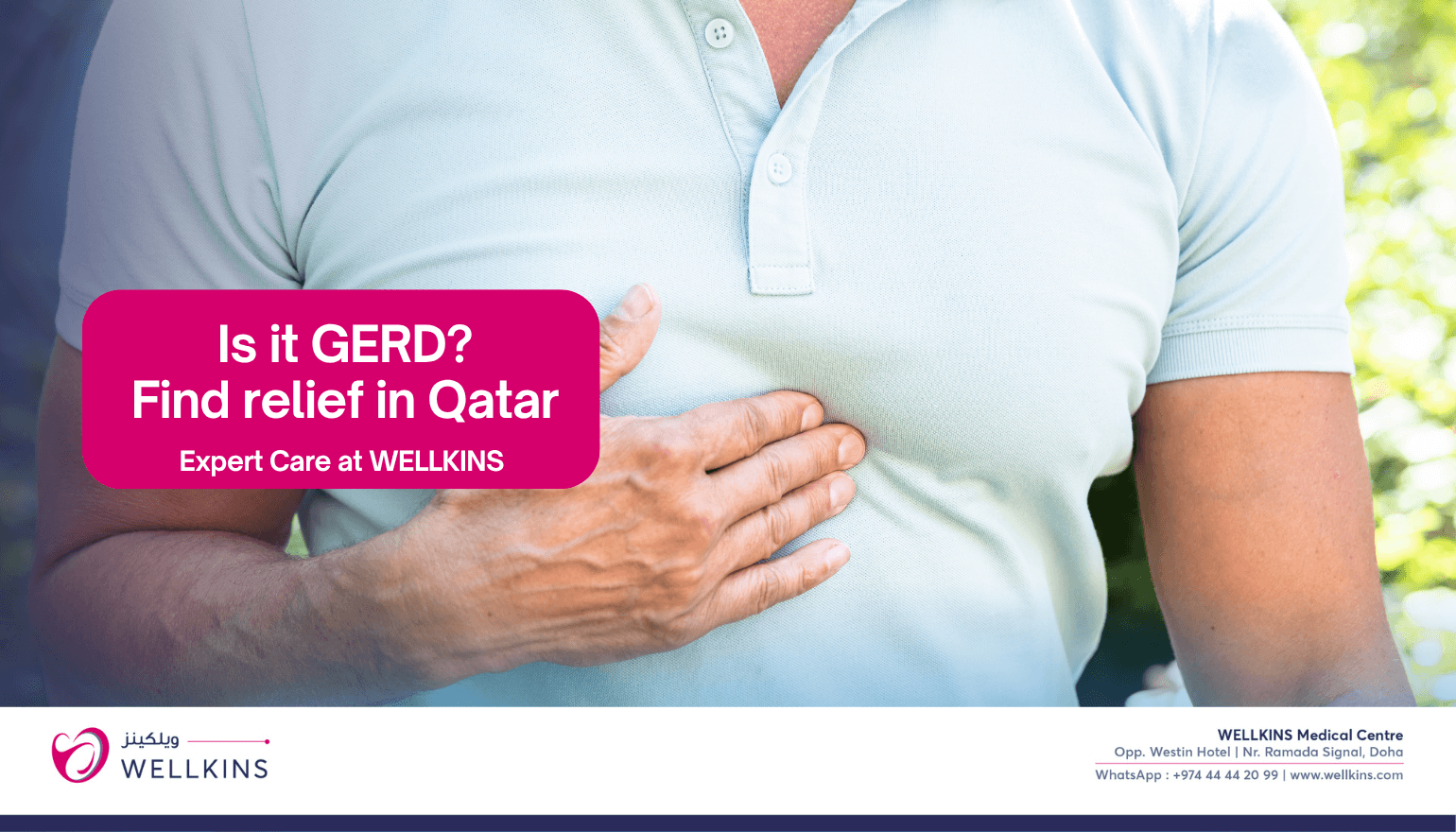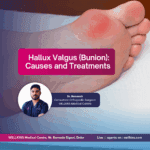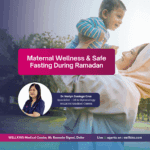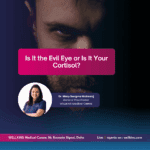Author:Dr. Cryscel Anne S Ramos, Internal Medicine Specialist at Wellkins Medical Centre
Do you often feel a burning sensation in your chest, especially after meals? Perhaps you struggle with difficulty swallowing or wake up with a sour taste in your mouth? These uncomfortable experiences could be more than just occasional indigestion; they might be signs of Gastroesophageal Reflux Disease (GERD). While many people in Qatar might dismiss these as simple indigestion, if they occur frequently or with severity, they are signals that your body needs attention. The good news is that GERD is a very treatable condition, and finding lasting relief is possible with the right medical guidance.
Focus on nurturing a healthy lifestyle by maintaining a healthy body weight and avoiding habits that weaken your digestive defenses. Prioritize quitting smoking, opting for loose-fitting clothing to reduce abdominal pressure, and integrating stress-reducing activities like walking or meditation into your daily routine. These conscious choices alleviate physical pressure on your stomach and strengthen the lower esophageal sphincter, significantly lowering your risk of acid reflux and promoting overall digestive wellness.
Understanding GERD: It’s More Than Just Heartburn
GERD occurs when stomach acid frequently flows back up into your esophagus the tube connecting your mouth to your stomach. While occasional acid reflux is normal, when these symptoms become frequent or severe, they can potentially damage your esophagus and significantly impact your daily life. Recognizing these signs early is crucial for effective management.
Symptoms of Gastroesophageal Reflux Disease (GERD)
The most common symptom of GERD is a burning chest sensation, often referred to as heartburn. This discomfort can be worse after eating, at night, or when lying down. Indicators of GERD include:
Heartburn: A burning sensation in your chest, often worse after eating, at night, or when lying down.
Regurgitation: The sensation of stomach contents or a sour liquid rising into your throat or mouth.
Difficulty Swallowing: A feeling of food being stuck in your throat (dysphagia)
Chronic Cough or Hoarse Voice: A persistent cough or a change in your voice, which can be caused by acid irritating your vocal cords.
Nausea, Vomiting, and Bloating: General digestive discomfort that accompanies meals
What Causes GERD?
Several factors can contribute to the development of GERD:
• Obesity: Excess weight can put pressure on your abdomen, forcing acid upwards.
• Smoking: Nicotine can relax the lower esophageal sphincter, allowing acid to reflux.
• Certain Medications: Some drugs can worsen GERD symptoms.
• Dietary Habits: Foods high in fat, caffeine, chocolate, peppermint, and acidic items can trigger symptoms.
• Stress: While not a direct cause, stress can exacerbate GERD symptoms.
When to Seek Medical Attention for GERD
While occasional heartburn is common, persistent or severe symptoms of GERD warrant medical evaluation. It’s important to consult a doctor if:
- You experience heartburn more than twice a week.
- Your symptoms are severe or interfere with your daily activities.
- You have difficulty swallowing (dysphagia) or a sensation of food being stuck in your throat.
- You have a persistent sore throat, hoarseness, or chronic cough.
- You experience chest pain, especially if it’s accompanied by shortness of breath, jaw pain, or arm pain, as these could be signs of a heart attack.
- You have unexplained weight loss.
- You are pregnant.
Proactive Steps: Preventing GERD.
While many people in Qatar and around the world seek treatment for GERD after it has developed, the most effective strategy is often prevention. By making conscious, proactive choices, you can significantly reduce your risk of ever experiencing the discomfort and potential health complications of Gastroesophageal Reflux Disease.
Understanding the Root Causes: Why Prevention Matters
GERD occurs when the lower esophageal sphincter (LES), a ring of muscle that acts as a valve between your esophagus and stomach, weakens or relaxes inappropriately. This allows stomach acid to flow back up. Factors that increase the pressure on this valve or weaken its function are the primary targets of any prevention strategy. These include:
Dietary Triggers: Certain foods and drinks can increase stomach acid production or relax the LES.
Obesity: Excess weight, particularly around the abdomen, puts pressure on the stomach.
Lifestyle Habits: Smoking, stress, and certain physical activities can all contribute to reflux.
By addressing these factors head-on, you can take a powerful step towards a GERD-free life.
1. Mindful Eating and Dietary Changes
What you eat and how you eat it are the first lines of defense against GERD.
Identify and Avoid Trigger Foods: Common culprits include spicy foods, fatty or fried meals, citrus fruits, tomatoes, onions, garlic, chocolate, mint, and carbonated beverages. Pay attention to how your body reacts to these foods and limit or eliminate the ones that cause you trouble.
Eat Smaller, More Frequent Meals: Large meals can overfill your stomach, increasing pressure on the LES. Opt for five to six small meals throughout the day instead of three large ones.
Chew Thoroughly and Eat Slowly: This aids in digestion and reduces the amount of air you swallow, preventing bloating and pressure.
2. Lifestyle Modifications
Beyond diet, your daily habits play a critical role in preventing GERD.
Maintain a Healthy Weight: Losing even a small amount of weight can significantly reduce pressure on your abdomen and stomach, strengthening the LES.
Quit Smoking: Nicotine is known to relax the LES, making it a major risk factor for GERD. Quitting smoking is one of the best things you can do for your digestive and overall health.
Avoid Tight-Fitting Clothing: Garments that are tight around your waist can compress your stomach and push acid back into your esophagus.
3. Optimize Your Sleeping Habits
Nighttime reflux can be particularly problematic. These simple adjustments can help you sleep soundly without discomfort.
Elevate Your Head: Gravity is your friend. Elevate the head of your bed by 6-8 inches using foam wedges or blocks. Simply using extra pillows is not as effective, as it can bend your body in a way that worsens reflux.
Time Your Meals Wisely: Avoid lying down for at least 2-3 hours after eating, especially a large meal. This gives your stomach time to empty before you go to bed.
4. The Power of Stress Management
The gut-brain connection is real. Stress can increase stomach acid production and slow down digestion, both of which are risk factors for GERD.
Incorporate Stress-Reducing Activities: Regular exercise, meditation, deep-breathing exercises, or yoga can all help manage stress levels and improve your digestive function.
Ignoring chronic GERD can lead to serious health complications over time. That’s why prompt and accurate diagnosis is so important. At Wellkins Medical Centre, we provide quick, accurate diagnosis using simple, personalized tests. Following a thorough assessment, we will develop a tailored treatment plan designed to give you fast relief. Our goal is to address the root causes of your symptoms and help you regain comfort.


